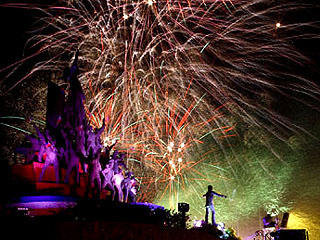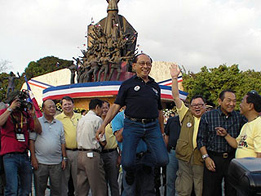Twenty-four years ago, the nation was swept up in a miraculous wave of magic - Cory magic, as it's called. Yellow ribbons spilled out everywhere: on houses and buildings, into the streets, and even from rifles. People poured forth by the tens of thousands. Even without today's technologically enabled mass gatherings, Filipinos were able to come together for a single cause: democracy.

Colorful fireworks mark the 24th anniversary of the 1986 People Power Revolution along Edsa on Wednesday night. Nykko Santos
The revolution that toppled two decades of dictatorship without bloodshed catapulted the Philippines to worldwide fame. Those who were there will attest to the unparalleled euphoria of freedom that they were ready to die for. Although the youth are arguably too young to see EDSA for what it was to the older generation, this does not by any means indicate a lack of concern. In the same manner that artists like Jess Santiago, Susan Fernandez, Noel Cabangon, and the APO Hiking Society laid down the soundtrack of the revolution, artists like The Jerks, Yano, Buklod, and Peace Pipe sustained the sentiment through the nineties. Today, we have artists like Jeff Pagaduan. Just as the People Power Revolution inspired Jim Paredes of APO Hiking Society to write the iconic song "Handog ng Pilipino sa Mundo," the reaction to the Ondoy disaster inspired Pagaduan to write one of his many socially relevant songs, "Oi." The song begins with a question:
Ilang Sona? Ilang EDSA pa ba? Ang ating babaybayin. Ang nangyari, nasa t-shirt na lang ang pagiging makabayan. Other current issues made their way into the song's lyrics, like Cory Aquino's death, the Con-Ass, and later on, the November 23 Massacre.
Si Tita Cory, nasa langit na. Ang pangako ng demokrasya, nasan na? Ito ba ang nais na kalayaan. Nahihirapan, pinagsasamantalahan. Di madali ang pagbabago, kung di ka kikilos. Di madali ang laban, kung ikaw ay nagbubulag-bulag, bulagan lang. Oi! Sino kaya ang may kasalanan? Sa pagpaslang sa mga inosenteng mediamen Pag di pa tayo natutong magsalita, baka sa susunod, tayo na naman. Ang isang boto, ay katumbas ng isang daluyan tungo sa magandang kinabukasan. Kaya kelangan itong pag-isipan, protektahan sa mga sakim na kung sino man. Di madali ang pagbabago, kung di ka kikilos. Di madali ang laban, kung ikaw ay nagbubulag-bulag, bulagan lang. Oi! Being socially relevant comes naturally to Pagaduan, a member of Stand UP who has been writing songs for a decade now. He says that when he plays, it is the older crowd that usually takes notice.
"Yung songs ko, kaya nakaka-relate yung mga matanda, kasi time nila yun, yung mga bagong about EDSA revolution, kung papano mo siya nadadala sa mga panahon ngayon. Meron ding mga bata, naa-appreciate din nila pero not to the point na lalapitan ka nila," he shares.

Former President Fidel Ramos reenacts his famous 'jump for joy' on Thursday at the Salubungan part of the 24th EDSA People Power Revolt anniversary rites. Raffy Tima
Pagaduan says no other musician in his age group comes to mind when it comes to his kind of music which, though activist, he considers to be flexible. When he plays at different events, he eases the audience in by playing love songs at the beginning of the set.
"Ang strategy ko minsan, syempre yung mga pa-tweetums muna na kanta. Pag nakuha mo na yung atensyon nila, bobombahan ko ng medyo socially relevant." Unlike in the past, when Bayang Barrios and Susan Fernandez had almost nightly gigs, venues for his type of music are few and far between in this decade. Pagaduan attributes this change to a shift in orientation. He observed that even UP, which is known for its activism, has been toned down.
"May mga venues kasi kung saan pino-promote nila yung ganung klaseng music. Yung number one, yung school. Eh ang dami na ring nagbago sa UP. Medyo nililihis na nila yung paniniwala na paglaban para sa mga karapatan ng tao, ng estudyante. Ang daming nagbago. Nawalan na ng venue, and since wala nang eskwelahan na sumusuporta sa ganun, mga orgs na lang - Samahan ng mga Nagkakaisang Artista, mga ganun, pero kakaunti na lang." EDSA's annual revival Pagaduan says the EDSA spirit is only revived occasionally, when needed:
"Actually, sa anniv na lang nakikita. Sa eleksyon ginagamit. 'Ituloy yung laban,' parang ginagamit mo yung diwa ng EDSA para ilagay sa posisyon." Despite this, he believes that EDSA's revolutionary spirit lives on, in some ways more than others.
"Buhay sa ibang environments, pero di kasing lakas ng dati. Sa NPA [New People's Army] siguro, kasi sila pa rin yung lumalaban, di ba? Sila pa rin yung hanggang ngayon hardcore," he says. Pagaduan mentions less extreme examples, citing everyday heroes like nurses and teachers.
"Nabubuhay, heto yung mga nurse na nagdecide mag-stay dito, mga teacher na kahit gaano kaliit ng sweldo, nagtuturo pa rin sila dito sa Pilipinas." From the sidelines to the stage Jess Santiago, one of the country's leading poets and folk singer-songwriters since the days of Martial Law, continues to write songs that are reflective of societal realities. His last album contained pieces about the
desparacidos and extrajudicial killings. According to Santiago, songs and other art forms synthesize the issues and serve as the voice of the people.
"Nasi-synthesize nila yung mga problema. Nagsisilibing tinig ng publiko o ng particular na sector," he said. Santiago recounts that even before the EDSA revolution, artists were already gaining ground.
"Kahit nung Martial Law days, marami nang nagsulat ng mga ganyang kanta. After martial law, bago mag-EDSA, dumami yung mga nagsulat ng ganung kanta. Dumami yung mga sumulpot na singing groups, chorale groups, pati yung mga individual songwriters," he added. He explained that the increase was brought about by consolidated efforts on the part of the artists themselves.
"Meron tayong efforts na magbigay ng mga pagsasanay sa songwriting, pagbuo ng cultural groups. Kasi dati, halos lahat ng mga mass actions, mga demonstrations, rallies, karamihan puro mga speeches lang ng mga tao, tapos yung mga kanta, nagiging parang intermission lang, in between speeches. Siyempre yung mga artists, songwriters, musicians, hindi sila masaya sa ganun," said Santiago. Following the establishment of
Musicians for Peace, musicians were no longer relegated to the sidelines. While earlier mass demonstrations had speeches as the main event and songs as intermission numbers, the situation was eventually reversed. He recalls a
Musicians for Peace congress which was attended by over a hundred musicians, including Tropical Depression, The Jerks, The Roots, and many others.
"Yung mismong mga kanta yung main event ng mga rallies, instead na dati pasingit-singit lang, intermission. Buong set na mismo kahit sa kalye, nakasakay sa flatbed truck, pagdating sa venue talaga ng rally. Yung mga speaker ang sumisingit-singit na lang, pero ang main form na ng mass action ay yung mismong concert." Following the EDSA revolution, the recording industry picked up on the fact that progressive music had a significant following, which allowed some artists to enter the mainstream.
"Marami ring napasok diyan sa mainstream. Yung iba nag-dissolution, yung iba nagpatuloy siyempre dahil sa iba't ibang mga kadahilanan, pero sa ngayon patuloy naman yan. Marami pa rin na mga bagong grupo, bagong composer na patuloy na nagsusulat tungkol sa realidad natin." Still, progressive music is mostly underground.
Beyond mainstream understanding "Karamihan ng mga ganung klaseng kanta di mo naman naririnig sa radyo. Yung general public talaga hindi nila alam yung mga piyesa, usually sa rallies tinutugtog, sa pubs, sa mga concert, pero hindi sila mainstream so hindi sila napapatugtog sa radyo, napapanood sa TV," said Santiago. He added that this is a disadvantage to the musicians. However, he says that in large events where all sectors of society are represented, progressive music receives a warm welcome.
"In terms of pagtanggap, yung mga malalaking mga rally halimbawa, kahit sa Ayala, Mendiola, Liwasan, na represented lahat ng sector sa lipunan, mula sa mga mahihirap, sa mayayaman, sa manggagawa, sa magsasaka, matutuwa ka talaga pa rin naman sa napakainit na pagtanggap sa ganung klaseng mga kanta." Meanwhile, performance poet and novelist Carlos Malvar says that the EDSA spirit may still be alive, but is overused.
"Ine-exploit yung diwa ng rebolusyon. Mantakin nyo yun, multinational company gumagamit ng slogans like 'Sulong!' dahil alam nila na patok sa Pinoy yang 'EDSA Revolution' spirit na yan!" Malvar opines,
"Wala dapat papel ang sining sa kahit anong 'rebolusyon'. 'Ebolusyon' siguro, meron pa: ebolusyon ng kamalayan o evolution ng consciousness, evolution ng taste o panlasa, evolution ng standards and values. Pero 'wag sa 'rebolusyon." You can’t fool the children of the revolution Nevertheless, the flame of nationalism continues to burn in the next generation of young musicians, the so-called children of the revolution. Percussionist Ino Magno, son of the late "Nightingale of the Philippine Progressive Movement", Susan Fernandez, says that Francis Magalona is a great example of what being a Filipino artist is really all about. "He was true to his music, his style, and his audience," he notes. On the role of art in a revolution, Magno says it keeps the message fresh. "The human race has long been battling for freedom, justice, and equality, to name a few, and yet we never tire ourselves from searching for what we think is ours to begin with. This is because we have the capability to develop infinite ways of expression, and that's art, no matter what." Magno says that with any kind of art form, the objective of your creation is to impart something to your audience.
"Ok lang kung maasar sila sayo, it's better to be hated than to be ignored. Basta nahimok mo silang mag-isip at 'wag lang tumunganga, then you're already successful in conveying your message." Magno says the music of his band
Sagabal is about battling apathy. "For us, our biggest enemy is not poverty or corruption, it is the lack of strength and willingness to act." Magno says the EDSA revolution wasn't just about overthrowing a corrupt and abusive regime, but about selflessness, unity, nationalism and pride. "Having this kind of fervor for your country can never be irrelevant," Magno affirms.
- TJD/YA, GMANews.TV 






